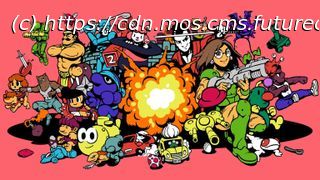On the making of 50 games in eight years.
For all its ebullience, and for all its palpable enthusiasm for the medium, there’s something deeply weird about UFO 50. The 50-game collection draws its power from constraints: the fictional hardware at its heart, the LX, is an 8-bit system with a 32-colour limit. The resulting aesthetic is immediately recognisable: Everyone knows the Nintendo and Sega systems of this era.
But people are less likely to know about the ZX Spectrum, and I’ll bet few are familiar with the Amstrad CPC 464 mascot Roland. Most people know about the Commodore 64, but can they name five games? (And if so, why isn’t one of them Mad Nurse?) The systems you never got to play are gaps in the continuum. In the internet age, dipping into the catalogue of the MSX platform, or the PC-8800 series of home computers, feels like visiting an alternate vision of the future that just didn’t take.
UFO 50 channels this uncanny atmosphere for me, telling the story of a mysterious 1980s game development studio while keeping to that most fundamental of storytelling tenets: show, don’t tell. Mossmouth isn’t telling the story of UFOsoft: it’s bringing it to life in the form of a whole game catalogue. UFOSoft now exists, and the sensibilities of its four central fictional developers don’t fit neatly with the canon.
I spoke to most of the UFO 50 team—the IRL UFO 50 team—earlier this week. My first point of curiosity was what source they were most inspired by. I told them the UFO 50 collection feels more akin to computer games of the ’80s, rather than the better known console games by the likes of Nintendo, Sega, Capcom et al. The actual point of inspiration was, of course, varied and highly personalised.
«In general, I’ve been very attracted to the aesthetics of computers and consoles that I never owned», said Derek Yu, Mossmouth founder, Spelunky creator, and one of the six UFO 50 developers.
«We were probably more influenced by the games we didn’t get to play as kids; the stuff we saw in magazines and fantasized about», said Eirik Suhrke, who not only worked on music for all of the UFO 50 games but also had a hand in design. Tyriq Plummer, who has worked with WayForward and on Cadence of Hyrule, picks up on the thread: «[I like] the idea of being influenced more by the things that you don’t experience, because they live larger in your brain and have more potential. The things you do experience are much more locked in and real in a way that kind of limits them.»
Plummer is the youngest on the UFO 50 team, so he never experienced the 8-bit era first hand: his exposure to those games of yore is via emulation. Yu, for his part, said he feels more indebted to MS-DOS games, while Jon Perry—a tabletop designer who has made games with Yu since childhood—points to early ’90s browser and freeware games as points of reference (Derek and Jon used the now defunct Klik and Play toolset to make games way back then). As for Paul Hubans—creator of The Indie Game Legend and the forthcoming Madhouse—he had the NES firmly in his sights while developing UFO 50.
The game was announced in 2017. Back then, Yu told us that it’d be out the following year.






